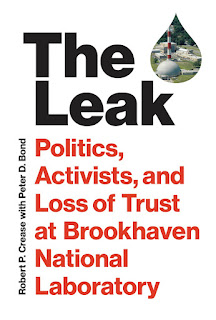Robert P. Crease is the author, with Peter D. Bond, of the new book The Leak: Politics, Activists, and Loss of Trust at Brookhaven National Laboratory. The book focuses on a 1997 leak of radioactive water near Brookhaven, on Long Island, and the aftermath. Crease's other books include The Great Equations, and his work has appeared in a variety of publications, including The New York Times. He is Professor in and Chair of the Department of Philosophy at Stony Brook University.
Q: Why did you decide to write about the leak at Brookhaven National Laboratory?
A: It’s about now. Activists spread fake facts. People decide to believe only science that fits their agendas. Politicians cave. Conspiracy theories damage people and institutions. The book shows the damage that such a toxic environment does to society. Oh, and I also loathe politicians and celebrities who advance their causes with lies, manipulation, and dishonesty.
Q: What created the “loss of trust” referred to in the book's subtitle, and what impact did it have?
A: Different groups of people lost trust in others: politicians, administrators, scientists, reporters – and even community groups lost trust with each other. Activists then set out to deliberately undermine public trust in responsible institutions.
The lab was not innocent; it didn’t detect a leak which it should have, and so it made sense to ask, if it screwed up on that what else might it have screwed up on? But the leak was of no consequence to anyone, and activists and politicians blew it all out of proportion for their own agendas.
Q: How did you research the book, and did you learn anything that especially surprised you?
A: It was a pandemic book. It was out of the question to interview people in person, but I discovered that people loved to talk on the phone or by Zoom. I had already gathered the necessary documents, but the conversations were enlightening.
What surprised me were the funny bits. Activists told a newspaper that they were going to chain themselves to the lab fence, giving reporters a terrific photo-op – and a lab scientist destroyed the pretense by showing up to point out that the lab had no fence, but that he would quickly make a section of one so the activists could have their photo-op as planned.
A newspaper editor wrote that the lab was creating dinosaurs, 40-foot spiders, and a UFO, then realized that not enough of his readers were getting that he was spoofing the media and activists. If only I had enough imagination to dream up those things!
Q: Robert Birgenau, former chancellor of UC Berkeley, said of the book, “Anyone who wants to understand why more than one million Americans have died of COVID should read this brilliant book. It dramatically describes a titanic clash between world-class science, dishonest activists and celebrities, amoral politicians, and the federal bureaucracy.” What do you think of that description, and how would you compare the events surrounding Brookhaven to those surrounding the Covid pandemic?
A: It's hard to put it better. In both cases, reputable scientists were smeared. Effective and trustworthy institutions were undermined. Politicians postured. People with agendas lied. Most of all, our public health suffered because activists were blaming diseases on the wrong causes for their own purposes.
Q: What are you working on now?
A: The episode got me interested in how important the relationship between science and society is, and how easily it's damaged.
Many philosophers of science work on technical things – data and theory, structure of theories, and so forth – but I think how science is received by politicians and society is critical. The key issues facing the planet today – things like climate change, epidemics, pollution, rising seas – all depend on trusting science. We’ve got to learn how to do that better.
Q: Anything else we should know?
A: So why did I write a book about a 25-year old event? Because it forces us to confront whether this is the way we want decisions about our health and welfare to be made. We don’t. We’ll destroy ourselves if we entrust those decisions to celebrities and agenda-driven people with the loudest voices, biggest media contacts, and richest war chests. Don’t you agree?
--Interview with Deborah Kalb


No comments:
Post a Comment